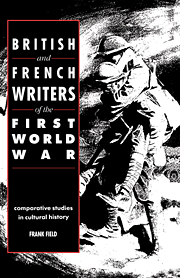
F. Field, British and French Writers of the First World War. Comparative Studies in Cultural History
FIELD, Frank, British and French Writers of the First World War. Comparative Studies in Cultural History, New York, Cambridge University Press, 2008, 292 p.
ISBN 9780521069106
RÉSUMÉ
The First World War dealt a profound shock to European society. In thisoriginal and stimulating book, the historian Frank Field looks at theexperiences of France and Britain during the war years as revealed inthe work of some of their most prominent writers responding to theunfolding catastrophe. Brooke, Wells, Shaw, Kipling, Lawrence, Owen andRosenberg are set alongside Jaurès, Barrès, Maurras, Péguy, Psichariand Rolland, as case studies of the war's impact on intellectual lifein their respective countries. The comparative perspective reveals deepdifferences between the French and the British experience, and yet ashared ordeal marked by the terrible ironies attendant on theshattering of common ideals. Literary images of war as a purificationrite were effaced by the bloody realities of the conflict and theprophecies of writers who came to feel increasingly distanced from theessential innocence of the world before 1914 took on a new tone, grimlyapocalyptic or bitterly disillusioned.
TABLE DES MATIÈRES
Introduction; Part I. Notre Patrie: 1. Jean Jaurès: the fight againstwar; 2. Maurice Barrès, Charles Maurras, Charles Péguy: the defence ofFrance; 3. Ernest Psichari: the call of arms; Part II. For everEngland: 4. Rupert Brooke: the soldier; 5. H. G. Wells, Bernard Shaw:prophecy and hearbreak; 6. Rudyard Kipling: stoicism and empire; PartIII. The Decline of the West: 7. Romain Rolland: above the battle; 8.D. H. Lawrence: nightmare and escape; 9. Isaac Rosenberg, Wilfred Owen:anthems for doomed youth; Epilogue.